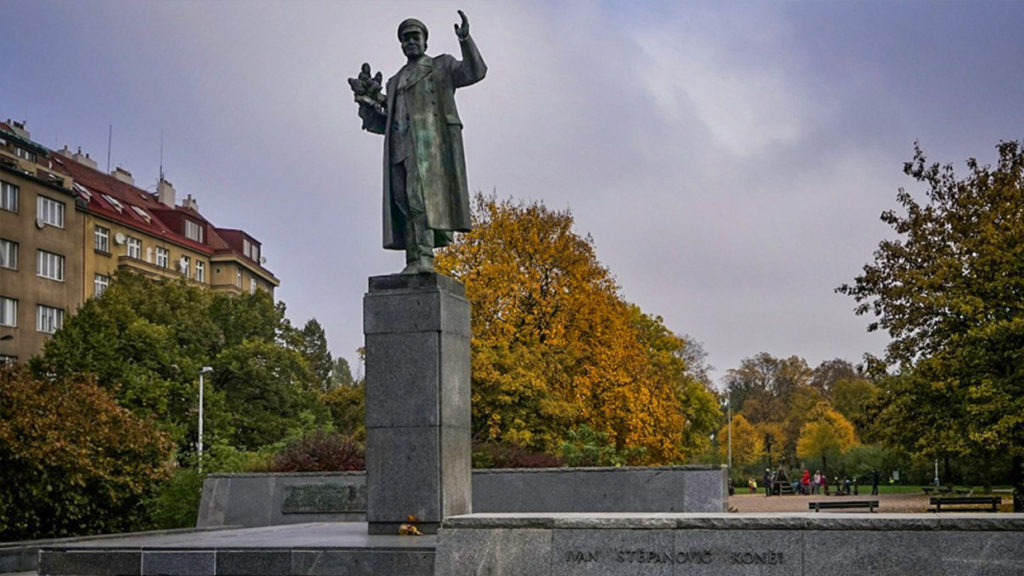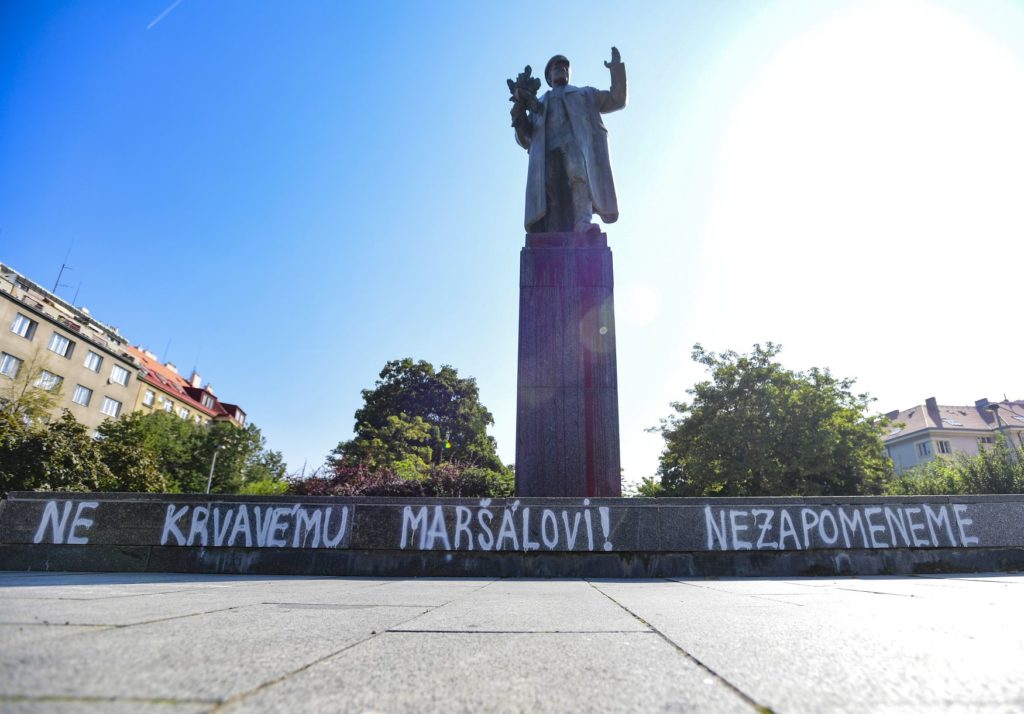Three weeks ago, a Russian intelligence operative flew to Prague.
He was driven directly from Prague airport by a Russian diplomatic car to the Russian Embassy in Prague, carrying a suitcase with „ricin“ poison, according to Czech intelligence sources.
The news is reported by Czech newspaper Respekt.
The politicians under protection are the Mayor of Prague Zdeněk Hřib and the Prague 6 Mayo Ondřej Kolář. Both of them have been confronting the Kremlin authorities in recent months.
The Mayor of Prague Hřib approved the renaming of a square where the Russian Embassy is located after slain Russian opposition politician Boris Nemtsov.
The council voted on the measure on February 24, changing Pod Kastany Square to Boris Nemtsov Square. The name officially changes on February 27 — the fifth anniversary of Nemtsov’s killing.
On April 22, the Mayor’s spokesperson Martina Vacková informed the Czech media that Hřib was put under police protection.
“The reasons and specific protection methods cannot be commented, following the decision of the police. For security reasons, the Mayor is currently unable to use public transport,” said Vacková.
A few weeks later, Prague’s District 6 council removed the statue of Ivan Stepanovic Konev, a World War II commander, whose statue was erected in 1980.
Czech President Miloš Zeman slammed the statute’s removal, accusing Kolar’s council of abusing the current coronavirus crisis, according to a presidential spokesperson.
A few days later, the Public Council at the Russian Ministry of Defense proposed renaming the Prazhskaya metro station in Moscow to Marshal Konev station.
The local council’s removal decision prompted an expression of indignation from the Russian Foreign Ministry, which on Friday spoke of an “unfriendly” act of “vandalism by unhinged municipal representatives.”
Czech President Miloš Zeman will attend celebrations marking the 75th anniversary of the Soviet Union’s Victory over Nazi Germany, which was scheduled to take place on May 9 but had to be postponed due to the coronavirus, as Zeman himself told Radio Frekvence 1 on Sunday.
“I accepted President Putin’s invitation,” Zeman pointed out. “I suppose that the celebrations will take place in September instead of May 9.
“It would be logical because World War II ended in September, and it was the war in Europe that came to an end on May 9,” he added.
Russian President Vladimir Putin announced on Thursday that the Victory Day parade and the Immortal Regiment march, initially set for May 9, would take place later in the year after the coronavirus threat is over.
The “risks associated with the epidemic, whose peak has not passed yet, are extremely high,” Putin said. “This does not give me the right to begin preparations for the parade and other mass events now.”
Victory Day is the most important public event remaining in Russia’s calendar. Western leaders have snubbed the parade since 2014, following Russia’s annexation of Crimea from Ukraine. Moscow’s alleged meddling in the US presidential elections and the poisoning of Sergei Skripal in Salisbury in 2018 have made relations even chillier.
Russia holds a military parade on Red Square with soldiers, tanks and intercontinental ballistic missiles and sees hundreds of thousands march with pictures of their relatives in a new tradition called the Immortal Regiment.
The number of Russian coronavirus cases has been accelerating in the last week.
There have been 47,121 cases of infections and 405 deaths, according to official figures, but the real number is believed to be higher.
The monument of Joseph Vissarionovich Stalin is put up for auction by Komarov authorities in the Beroun region.
The opening bid for the monument of the Soviet dictator is 20,000 CZK. The sandstone statue is currently placed in storage. Potential buyers have already shown interest in the purchase.
The monument was placed in Komarov’s náměstí Míru in 1951. After the revolution in 1989, the monument was dismantled and stored in a warehouse.
According to Deputy Mayor Radim Šíma, the current decision to sell Stalin’s monument is not connected with the statue of Marshal Konev in Prague 6, removed two weeks ago. “I would say that this is just an odd coincidence,” he said.
According to Šíma, the first proposal to buy the statue has already been received. Bids can be submitted until April 30. The minimum price is set at 20,000 CZK.
This is not the first time that a statue of a former Soviet leader in the Czech Republic has been put on sale.
In 2010, a bronze statue of Stalin was sold in Litoměřice for 172,000 CZK.
Last month, the German leftist party MLDP bought a two-meter statue of Lenin for an unrevealed amount.
The Public Council at the Russian Ministry of Defense proposed renaming the Prazhskaya metro station to Marshal Konev station.
A letter requesting support for this initiative was sent to Defense Minister Sergei Shoigu. According to members of the Public Council, it would be the right response to the dismantling of Marshal Konev monument in Prague.
On April 3, the Soviet general’s statue in Prague was removed by a local council, prompting protest from Moscow. Ivan Konev led the liberation of the Czech capital in 1945, but many Czechs criticize his crackdowns after World War II.
Local Prague politician Ondrej Kolar declared: “Konev has been toppled, but Konev will stand again — only in the museum.”
Czech President Milos Zeman slammed the statute’s removal, accusing Kolar’s council of abusing the current coronavirus crisis, according to a presidential spokesperson.
Moscow has vehemently protested the removal of the statue.
The local council’s removal decision prompted an expression of indignation from the Russian Foreign Ministry, which on Friday spoke of an “unfriendly” act of “vandalism by unhinged municipal representatives.”
On April 9, Russian Defense Minister Sergei Shoigu asked his Czech counterpart, Lubomir Metnar, to hand over the statue to Russia. Metnar refused, saying it belonged to the city of Prague.
Join us on Telegram and follow our Insta Stories to read the latest updates on the coronavirus in the Czech Republic.
The Kremlin would like to see the monument to Soviet Marshal Ivan Konev that was taken down recently in Prague reconstructed in either the Czech Republic or in Russia, if need be.
The bronze statue of Soviet Marshal Ivan Konev was taken down last week to make way for a World War II memorial, prompting the Russian embassy to protest.
On Thursday, Defense Minister Sergei Shoigu wrote to his Czech counterpart Lubomir Metnar asking him to hand over the statue to Russia.
The Czech minister responded this was not possible because the figure belongs to the city.
“We do not accept these actions and express our regrets in view of this. Of course, we would like to have this monument reconstructed — either on Czech land whose residents should be grateful to this man, we are convinced, or on Russian land if need be,” Kremlin spokesman Dmitry Peskov told reporters.
Russia’s Investigative Committee, which examines serious crimes, said it had opened a probe into “defiling symbols of Russia’s military glory,” a charge punishable by a fine or community service.
Although the move is largely symbolic, the issue could affect diplomatic relations between the two countries.
Last August, the statue was covered in red paint by unnamed vandals. Prague city hall then covered up the statue, but pro-Konev protesters tore down the tarp and held a rally in its support.
The monument was similarly abused many times before.
Marshal Kove statue was originally unveiled during the Victory Day celebrations on May 9, 1980.
A Czech citizen chained himself to the monument of Soviet Marshal Ivan Konev in Prague in protest against the municipal authorities’ decision to move it to a different location.
“The controversy surrounding the monument to Konev, caused by the Prague District 6 municipal authorities’ decision, affects me personally,” the civil activist told reporters. “My grandfather fought in World War II, that’s why this matter is definitely of my concern.”
The man, who arrived to the capital from the north of the country, said his views were “neither pro-Russian nor pro-American.”
The Communist Party of Bohemia and Moravia, whose support in parliament is important for the country’s government, urged the Cabinet on Monday to hinder plans to relocate the monument.
The municipal council of the Prague-6 municipal district on Thursday voted to relocate the monument to Konev and to create a Prague Liberation Memorial instead. The municipality is still to select a site where the monument to Marshal Konev will be moved.
The Russian Foreign Ministry on Friday expressed indignation over the decision to relocate the monument and warned that such a step would not remain without retaliation.
“The decision made at the municipal level is capable of becoming a major irritant in bilateral relations and overshadow their climate and it will certainly not remain without retaliation. We expect that the initiators of the unprecedented step will change their mind and realize all the consequences of this outrage,” the ministry said.
The monument was placed in Prague in 1980 on the occasion of the 35th anniversary of the city’s liberation by the Red Army’s forces under Marshal Konev’s command. The monument is a property of the municipal authorities.



